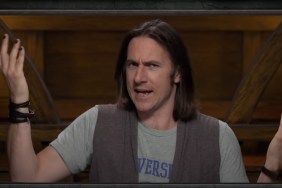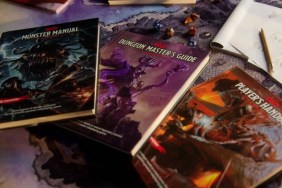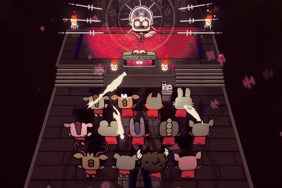Take off to the great wide Norse.
“Once upon a time in a generic fantasy world…a world which, of course, was in peril…”
So begins the official trailer for Paradox Interactive’s forthcoming Magicka, firmly establishing upfront the game’s refreshing, pervasive, tongue-in-geek tone. Magicka is a top-down action game for 1 to 4 players set in a suspiciously familiar high-fantasy world that seems to be equal parts casually-diluted Norse mythology, top-down old-school videogame hat-tippery, and gleefully gratuitous, genre-swirling humor from the farthest-flung realms of nerd-reference culture. It also appears to hold the promise of a great drinking game… but that might be just us.
[image1]Catch any given few seconds of a four-player Magicka session out of the corner of your eye, and it might seem reminiscent of the multiplay videogame classic Gauntlet, only set largely in sprawling outdoor/natural environs… and with player-parties comprised entirely of wizards. And that’s basically correct: Each player in Magicka is in fact a staff-carryin’, robe-wearin’, spell-packin’ wizard, on a (mostly) cooperative Quest to shut down an even more powerful wizard who’s been wreaking magical havoc. The Paradox folks haven’t mentioned any powerful magical artifacts that have been broken into pieces and scattered across the land… but we wouldn’t put it past them, either.
All along the way to this ultimate confrontation, players will encounter humorous references not only to other high-fantasy games, movies, and books, but also to numerous bits of geek culture that may or may not even remotely fit the pseudo-medieval setting. At one point, we encountered two charred cartoon-corpses outside a burned-out villager dwelling—said smoking deaders laid out in precisely the same attitude as the bodies of Luke Skywalker’s Uncle Owen and Aunt Beru. “This looks like the work of goblins,” one of the characters quips.
While each of the four possible player-wizards can execute melee attacks, the real focus of the game is on quickly putting together elemental magic spells—dynamic in their reactions with both other spells being cast and with the surrounding environments. Quick taps in the cardinal directions with the analog stick each ‘pre-load’ one iconic bit of elemental ‘ammunition’, as it were—one ’round’ of water, earth, fire, lightning—after which the complete spells (resulting from the countless possible combinations of said elemental bits) can be thrown up like a defensive shield, detonated like a bomb, or directed in a powerful, focused magical blast.
[image2]It costs no personal energy, ‘mana’, or anything like that to whip up and crank off these elaborate magical combos. But the real challenge lies in the sheer time and manual-dexterity-under-pressure required to analog-stick these oft-elaborate spells into existence… while the reanimated skeletons, gargantuan snake-monsters, club-wielding orgres, fireball-slinging magic-users and assorted, flaming whatever-the-hells around you are working you over.
It’s beneficial and often necessary for player-wizards to work cooperatively—one casting a temporary, magical defensive wall, for example, around the party while two other players frantically click up a two-parts-earth-and-two-parts-flame spell that translates to a devastating fireball attack. The same sorts of area-effect and/or focused-beam mechanics that work with attacks can also apply to defensive measures and healing, so one player can cast spells of healing on himself, or another, or all party members—provided he has the time to do so safely.
Of course, we all know how these ‘cooperative’ game experiences can quickly degenerate, given the right mix of player ‘frienemies‘. So naturally you can, and probably will, easily end up cooking one or two of your own party members with that hastily-cast fireball spell. And if that pisses them off, they can just as easily turn their attention from attacking any advancing monsters to laying an enchanted bolt of electric revenge on you instead. Like I said: Real promise as a drinking game.
[image3]From what we’ve seen, the vast majority of the game takes place in natural settings—paths through sprawling forests, the banks of still lakes or flowing rivers, bottlenecks at bridges both natural and man-made, and a host of other open, outdoor settings. Things start getting even more interesting when the constant fireworks display of onscreen spell-casting begins to react dynamically with the environments. Frantically click up a ‘four-ice’ spell and set it off in the vicinity of a pack of enemies near a stream, and you’ve not only frozen said entire pack of foes, but the stream itself—which means you’ve also just created a temporary, traversable bridge for the even bigger pack of hostile monsters massed just on the opposite bank. So good job there, Merlin.
And lastly, when you’re not under actual attack by monsters or bloodyminded, vengeful members of your own party, you can look forward to a wide range of sarcastic disdain and general verbal abuse at the virtual hands of numerous wise-ass NPCs that populate the countryside: “Maybe I, too, should put on my bathrobe and prance around in the forest!”
Magicka will offer 13 levels in the main cooperative campaign game, in which players can find secret items, challenges, new Magicks, and a constant shower of geek-reference minutia—or, as the Paradox folks so proudly and succinctly put it: “Experience the parody and satire of a clichéd fantasy world!” Magicka will be called into downloadable existence (for PC and consoles) later in 2010—and you can bet your dingy, frayed Bathrobe of Mithral Inebriation that we’ll conjure up a full review.











